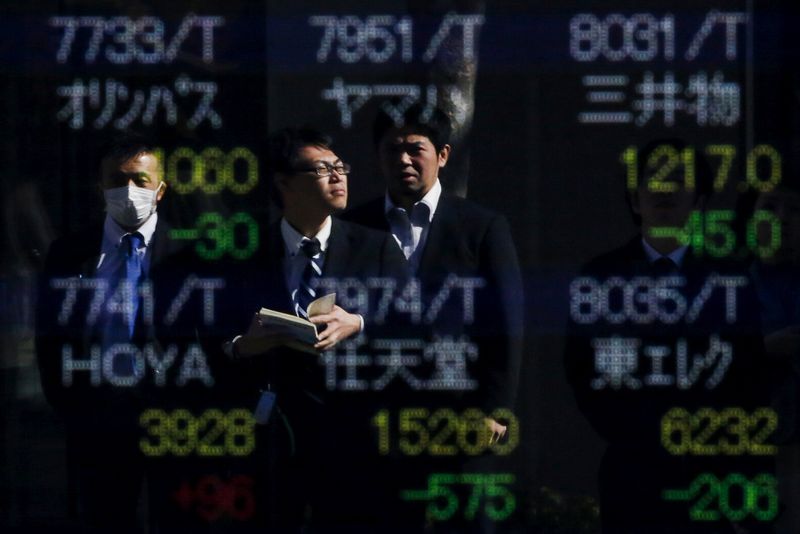By Mike Dolan
LONDON (Reuters) -Even after a bank shock that could well have changed the whole picture, investors appear reluctant to give up the ghost just yet.
Far from running for cover, asset managers doubt the now seemingly contained banking stress will prove systemic. And most view the net fallout as another drag on growth and inflation to varying degrees that may bring a significant relief in stopping central banks from tightening much further from here.
In truth, most admit it's just too early to tell amid numerous imponderables about the likelihood of recession unfolding and fuzzy debates about what would constitute a hard or soft landing.
But what's for sure is the upheaval in March - the latest in what Fidelity International dubs the 'polycrisis' - has not cleared the decks - not yet at least.
A casual glance at world markets as we end the first quarter still shows - wild March volatility and U.S. bank swoons aside - a relatively healthy picture for the year to date, albeit one recovering from a dire 2022.
While U.S. regional bank stock indices have clearly suffered an outsize hit of about 20% due to the March stress, the wider S&P500 is on track to end the first quarter on Friday some 5% higher. The tech-heavy, interest-rate sensitive Nasdaq is up 14% and even broad European bank stock indices are still up more than 4% for the year.
Indeed Big Tech stock groupings such as the FANGs - which capture the likes of Facebook-parent Meta, Apple (NASDAQ:AAPL), Netflix (NASDAQ:NFLX) and Google-parent Alphabet (NASDAQ:GOOGL), are up a whopping 33% as they reshape post-pandemic business, shed staff and eye the unfolding boom in new Artificial Intelligence apps.
Pull the lens out as far as it can go and MSCI's all-country index of world stocks is up more than 5%.
Stock volatility indices, such as the VIX 'fear index', have returned to levels seen just before the Silicon Valley Bank problems emerged three weeks ago - more than two points lower than where they started the year.
Of course, that's all partly due to an assumption a brewing credit crunch could stop Federal Reserve interest rate rises in their tracks and see easing by year-end.
That U-turn in thinking during the month saw wild swings in the bond and rates markets, where key volatility gauges hit their highest since the 2008 crash. But even this rates seismograph is down by a quarter from mid-month peaks.
Futures markets remain undecided about whether there's one more Fed rate hike left in May - but now seem convinced in about a half point of easing by the 2023.
Extraordinary gyrations in two-year U.S. Treasuries that best reflect the scale of macro uncertainty are starting to calm too, getting a toehold back above 4% are settling just about 25-30 basis points below where they started this year.
The dollar, which largely sat out the March bank crisis, is a modest 1% lower so far this year.
CHOOSY IN A FOG
Whether that pricing superstructure is complacent or not clearly hinges on what you think the wider economy will deliver over the remainder of the year.
But views on that have gone around in circles since December - first an assumption of a global recession in 2023, followed by a rethink on the euro zone and China over weather and lockdowns; then signs of re-acceleration in America and talk of 'no landing'; and now back to recession jitters over bank credit.
And it's foggy as ever.
Societe Generale (EPA:SOGN)'s strategists said that of the dozen indicators they monitor for signs of a U.S. recession - including rolling jobless averages, Fed surveys, confidence indices, credit signals and housing - half were flashing red, four green and two 'amber'.
Fidelity chief investment officer Andrew McCaffery reckons continuous western rate hikes are clearly "taking their toll", even if China's reopening builds some resilience worldwide, and recession in developed markets is the "likeliest outcome".
And while March bank stress does not change his medium-term view, McCaffery thinks markets still underprice that recession, credit is where to worry most and "a further policy tightening will increase the chance of a much harder landing."
Consensus earnings growth forecasts for the S&P500 as a whole for calendar 2023 have fallen to zero - though not yet below and with a substantial 12% rebound pencilled in for 2024. Bond risk spreads, meantime, did jump this month - but never exceeded the peaks of 2022 and nowhere near pandemic highs.
Barclays (LON:BARC) suspect this is unrealistic.
"Markets are pricing the best of both worlds: a recession that brings inflation down rapidly and keeps rates low, yet one where corporate earnings do not fall sharply. We are sceptical and think both bonds and U.S. stocks look expensive," it added.
Most think this is a world for active rather than passive management, sectoral and regional preferences - with many still thinking European stocks hold more value - and most are keen to stay in 'defensive' or 'quality' areas just in case.
BlackRock (NYSE:BLK)'s global equities team remains convinced of the end 'cheap money era' of the past 15 years, doubts credit policy easing will come any time soon and sees fewer returns from overall markets gains in favour of being 'choosy' in more active management.
But portfolios already light on equity coming into the year refuse to throw in the towel.
If you concentrate on quality, Federated Hermes global equities head Geir Lode thinks there's plenty of opportunities and sees the 'sustainable' stocks they watch selling at attractive discounts to the wider market yet again.

"Buying the dip has been one of the best investment strategies this year." Lode said.
The opinions expressed here are those of the author, a columnist for Reuters.
(by Mike Dolan; Editing by Toby Chopra; Twitter: @reutersMikeD)